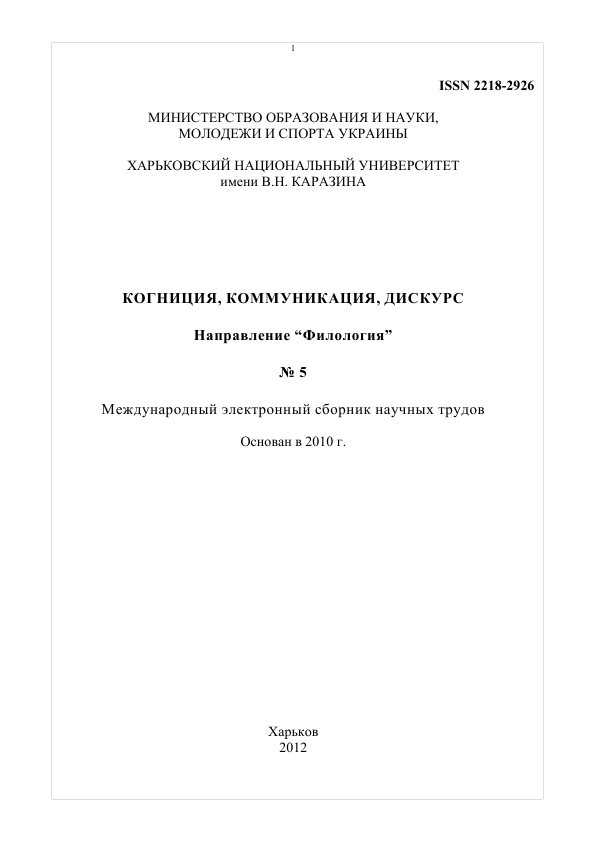Textual and Discursive Aspects of Modern English Joke
Abstract
Being a complex study of text-discourse properties of modern British and American jokes the analysis integrates their formal/compositional, textual, genre and discourse aspects. The joke is considered as a discourse format, the appearance of which is conditioned by perceiving a person’s communicative activity within the laughing culture and examining it in the context of its social setting and situation of performance. Incongruity is the basic cognitive mechanism which manifests itself both at the linguosituational (deviation from onthological, referential, logical, conceptual, discursive norms) and the linguistic level (deviation from lingual, speech, textual and genre norms). The paper also explores the interpretative role of the addresser and the addressee, pragmastylistic functions of anthroponyms, functions of
intertextual elements in creation of comic effect in the narrative joke.
Downloads
References
Левинтон Г.А. "Интертекст" в фольклоре / Г.А. Левинтон // Folklore in 2000. Voices amicorum GuilhelmoVoigt sexagenario. – Budapest, 2000. – P. 21–28.
Петренко М.С. Современный анекдот в текстовом, жанровом и дискурсивном аспектах: дис. … канд. филол. Наук: 10.02.01 / Петренко Максим Сергеевич. – Таганрог, 2004. – 216 с.
Рюмина Т.М. Эстетика смеха. Смех или виртуальная реальность / Т.М. Рюмина. – М.: УРСС, 2003. – 320 с.
Самохіна В.О. Жарт у сучасному комунікативному просторі Великої Британії і США: текстуальний та дискурсивний аспекти: дис … доктора філол. наук: 10.02.04 / Самохіна Вікторія Опанасівна. – Київ, 2010. – 518 с.
Norrick N. Intertexuality in humour / N. Norrick // Humor. International Journal of Humor Research. – 1989. – 2(2). – P. 117–139.
The Concise Oxford Dictionary of Current English. – 6th edition, ed. by J.B. Sykes. – London: Book Club Associates, 1979. – 1368 p.
1000 more jokes for kids / by Michael Kilgarriff – New York: Ballentine Books, 1982. – 216 p.
5600 jokes for all occasions / by Mildred Meiers and Jack Knapp. – New York: Wings Books, 1980. – 605 p.
Biggest Joke Book in the World / by Matt Rissinger and Philip Yates. – N.Y.: Sterling Publishing Co., Inc., 1996. – 192 p.
Boskin J. Rebellious Laughter: people's humor in American culture / Joseph Boskin. – N.Y.: Syracuse Univ. Press, 1997. – 245 p.
Fright Fully Gross Jokes / by Julius Alvin. – New York: Zebra Books. Kensington Publishing Corp., 1999. – 128 p.
Jokes and Anecdotes. Humor to Fit any Occasion / Ed. by Joe Claro – 2nd ed. – N.Y., etc: Random House, 1996. – 266 p.
Jokes off / by Johnny Lyons. – New York: Zebra Books, Kensington Publishing Corp., 1998. – 124 p.
Joking off II / by Johnny Lyons. – N.Y.: Zebra Books, Kensington Publishing corp., 1998. – 124 p.
Milton Berle's private joke file / by Milton Berle. Ed. by Milt. Rosen. – N.Y.: Three Rivers Press, 1989. – 642 p.
Take my Wife, please. Henny Youngman's Giant Book of Jokes. – N.Y.: A Citadel Press Book. Publ. by Card Publishing Group, 1998. – 334 p.
The Best Jokes for all Occasions / Revised by Jerry Lieberman. – USA, N.Y.: Powers Moulton, 1965. – 224 p.
The Big Book of Gross Jokes / by Julius Alvin. – N.Y.: Kensington Publ. Corp., 1997. – 186 p.
The Book of British Humour / Compiled by Judith King, Ronald Ridout, D.K. Swan. – London: Longman. Longman Structural Readers Stage 4, 1982. – 58 p.
Authors, who publish with this journal, accept the following conditions:
The authors reserve the copyright of their work and transfer to the journal the right of the first publication of this work under the terms of the Creative Commons Attribution License (CC BY), which allows other persons to freely distribute a published work with mandatory reference to the authors of the original work and the first publication of the work in this journal.
Authors have the right to enter into separate additional agreements for the non-exclusive dissemination of the work in the form in which it was published by this journal (for example, to post the work in the electronic institutions' repository or to publish as part of a monograph), provided that the link to the first publication of the work in this journal is given.
The journal policy allows and encourages the authors to place the manuscripts on the Internet (for example, in the institutions' repositories or on personal websites), both before the presentation of this manuscript to the editorial board and during review procedure, as it contributes to the creation of productive scientific discussion and positively affects the efficiency and dynamics of citing the published work (see The Effect of Open Access).




